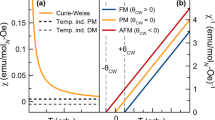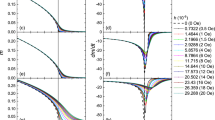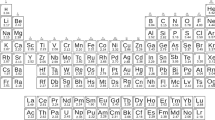Abstract
THE dependence on temperature of the magnetic susceptibilities of the transition elements has been measured over various ranges of temperatures1, and a series of experiments is now being carried out in this Department in an attempt to confirm some of the results and extend others in the temperature range 20°–1,800° C. Preliminary results have been obtained for the elements platinum, rhodium, zirconium, titanium, tantalum and niobium. The room temperature values of the susceptibilities (measured by comparison with platinum at room temperatures) and the values at temperature intervals up to 1,750° C. are given in Table 1.
This is a preview of subscription content, access via your institution
Access options
Subscribe to this journal
Receive 51 print issues and online access
$199.00 per year
only $3.90 per issue
Buy this article
- Purchase on Springer Link
- Instant access to full article PDF
Prices may be subject to local taxes which are calculated during checkout
Similar content being viewed by others
References
Kriessman, C. J., and Callen, H. B., Phys. Rev., 94, 837 (1954).
Squire, C. F., and Kauffmann, A. R., J. Chem. Phys., 9, 673 (1941).
Kriessman, C. J., Rev. Mod. Phys., 25, 122 (1953).
Author information
Authors and Affiliations
Rights and permissions
About this article
Cite this article
KOJIMA, H., TEBBLE, R. & WILLIAMS, D. Variation with Temperature of the Magnetic Susceptibility of Some Transition Elements. Nature 185, 90–91 (1960). https://doi.org/10.1038/185090a0
Issue Date:
DOI: https://doi.org/10.1038/185090a0
Comments
By submitting a comment you agree to abide by our Terms and Community Guidelines. If you find something abusive or that does not comply with our terms or guidelines please flag it as inappropriate.



